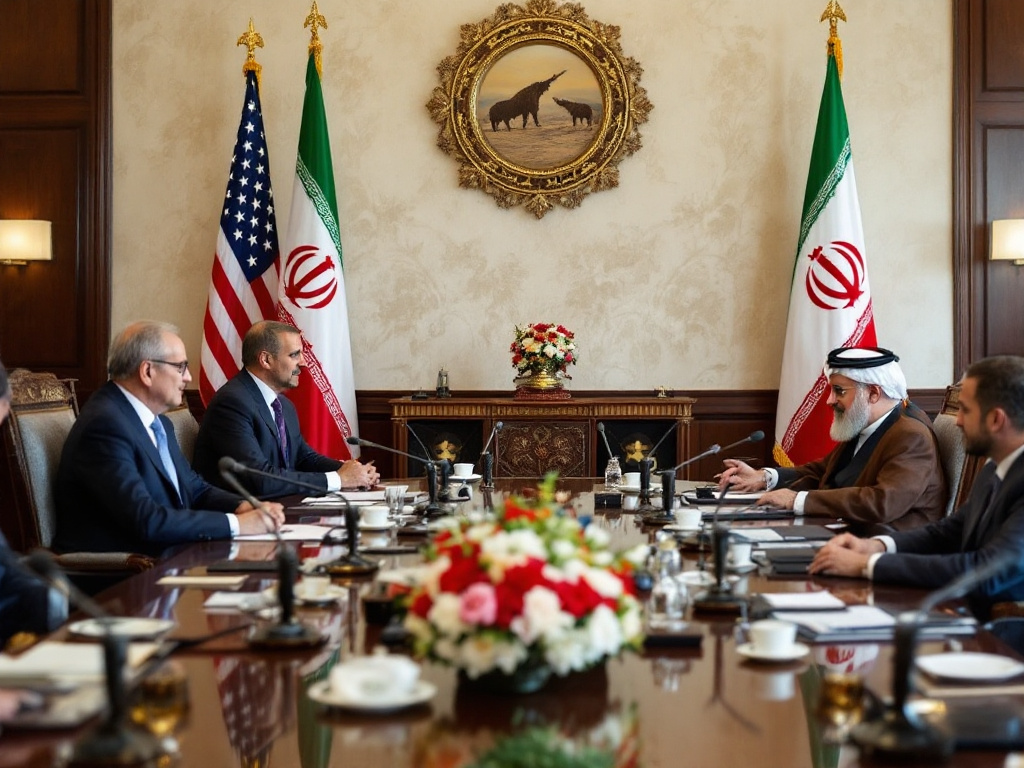Articles in this Cluster
13-04-2025
The US and Iran held their first round of nuclear talks in Oman, describing the meeting as "constructive". The talks, mediated by Oman's foreign minister, were the highest-level meeting between the two nations since 2018. US envoy Steve Witkoff and Iran's Foreign Minister Abbas Araghchi led the delegations, with the two meeting briefly in person. A second round of discussions is set to take place next week. The US is seeking a deal to prevent Iran from acquiring nuclear weapons, while Iran hopes for a deal to limit its nuclear programme in exchange for sanctions relief. Iran has insisted its nuclear activities are peaceful and that it will not develop or acquire nuclear weapons, but has breached restrictions imposed by the 2015 nuclear deal since the US pulled out in 2018.
13-04-2025
Iran is seeking a "real and fair" agreement with the US on its nuclear program ahead of talks in Oman, according to a senior aide to Ayatollah Ali Khamenei. The talks, set to take place on Saturday, aim to reach a deal on Tehran's nuclear program, with US special envoy Steve Witkoff meeting with Iranian Foreign Minister Abbas Araghchi. The US and Iran have been warning each other of potential consequences if talks fail, with President Trump stating that military action is "absolutely" possible, while Iran has threatened to expel UN nuclear inspectors.
13-04-2025
The US and Iran will hold further negotiations next week regarding Iran's nuclear program, according to Iranian state TV. The first round of talks, held in Oman, lasted over two hours and were described as "very positive and constructive" by the White House. US Mideast envoy Steve Witkoff and Iranian Foreign Minister Abbas Araghchi spoke indirectly, with the Omani foreign minister acting as a mediator. The talks centered on Iran's rapidly advancing nuclear program, with the US seeking to prevent the country from developing nuclear weapons, while Iran is seeking sanctions relief.
13-04-2025
Delegates from the US and Iran held talks in Oman, mediated by Omani officials, in an effort to restart negotiations over Iran's nuclear program. The talks come nearly seven years after President Donald Trump withdrew the US from the 2015 nuclear deal with Iran. Trump has imposed new sanctions on Iran as part of his "maximum pressure" campaign, but has also expressed willingness to negotiate a new deal, including by sending a letter to Iran's Supreme Leader Ayatollah Ali Khamenei. Iran's President Masoud Pezeshkian has rejected direct talks with the US, saying they must first prove they can be trusted. Tensions between the two countries remain high, with Iran enriching uranium to near weapons-grade levels and threatening to retaliate against any US-led attack.
13-04-2025
The US and Iran held their first direct nuclear talks in years on Saturday in Oman, with US Special Envoy Steven Witkoff meeting Iranian Foreign Minister Abbas Araghchi. The White House described the discussions as "very positive and constructive." The talks come as Iran continues to expand its nuclear program, enriching uranium to 60% purity and stockpiling over 18,000 pounds of it. The US has sent a clear signal to Iran by moving powerful military assets into the region, including B-2 stealth bombers and two aircraft carriers. Experts say Iran is facing a choice between negotiating or facing potential military action, and that any future deal will need to include strict terms such as real inspections and limits on their ballistic missile development. The two nations are scheduled to meet again on April 19 in Oman.
13-04-2025
The US and Iran are set to hold talks over Iran's nuclear program in Oman, with US Middle East envoy Stever Witkoff potentially meeting with Iranian Foreign Minister Abbas Araghchi. The two sides have differing views on the format of the discussions, with the US insisting on "direct" talks and Iran maintaining they will be "indirect". Iran expert Behnam Ben Taleblu said the public controversy is a game of leverage, with both sides trying to gain an advantage. Iran has made significant gains in enriching uranium to near-weapons-grade quality and has closer ties with US adversaries like Russia and China, giving it leverage. However, the US has a range of options to incentivize or coerce Tehran, including economic sanctions and military action. President Trump has threatened to "bomb" Iran if it doesn't engage in nuclear talks and has said time is running out to stop Iran from developing a nuclear bomb.
13-04-2025
Iran has held "indirect talks" with the US over its nuclear programme, mediated by Oman, with representatives from both countries seated in separate rooms. The talks, described as "very positive" and "constructive", were the first between the countries since US President Donald Trump's second term began. More negotiations are set to take place next week, with the White House saying a further meeting will occur next Saturday. The discussions are focused on de-escalating regional tensions, prisoner exchanges, and limited agreements to ease sanctions in exchange for controlling Iran's nuclear programme. Trump warned that Iran would be in "great danger" if negotiations fail, insisting that Tehran cannot have nuclear weapons.
13-04-2025
US-Iran indirect talks in Oman exceeded expectations, with both sides laying out their starting positions and agreeing to potentially meet again within a week. The initial two-hour meeting was seen as a trust-building exercise, but further rounds are expected to be more complicated as the two sides have incompatible positions on Iran's nuclear programme. The talks, facilitated by Oman, are seen as a crucial step towards a potential nuclear agreement, but will require flexibility and patience from the US, led by President Trump, who has set a short window to achieve a deal.
